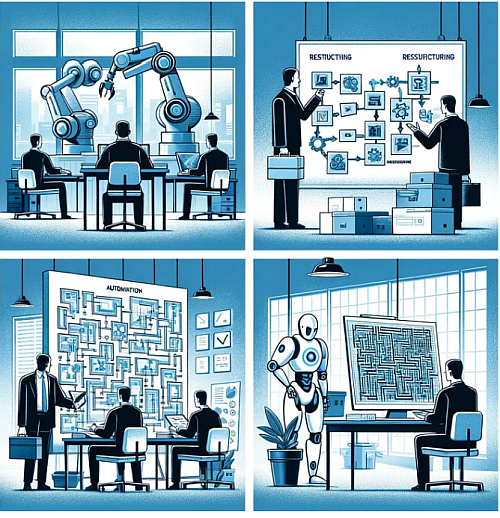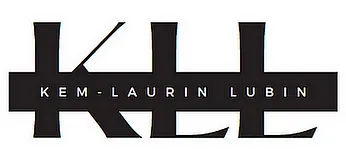Thank you to Kem-Laurin Lubin, PH.D - C for sharing her knowledge and expertise with us.
You can read this article on Medium.

“Huge swathes of people spend their days performing jobs they secretly believe do not really need to be performed. The moral and spiritual damage that comes from this situation is profound. It is a scar across our collective soul. Yet virtually no one talks about it.” — David Graeber
As technology continues to advance at a rapid pace, automation is reshaping the global workforce and there is a collective growing anxiety for many who are wondering what their job futures look like. From artificial intelligence (AI) to robotics, automation is revolutionizing industries, streamlining processes, and increasing efficiencies of tasks once carried out by humans.
While automation brings many benefits, it also raises concerns about job displacement. And, if you’ve been noticing certain trends and developments in your industry or workplace, there may be clues that your job could be automated in the near future.
Generally speaking, automation is reshaping the job landscape, and it’s essential to be proactive in preparing for potential changes. Take a look at what you do — if you notice repetitive tasks, increasing AI integration, Robotic Process Automation (RPA) implementation, smart machines, and industry-wide automation trends in your job or sector, it’s time to consider upskilling and adapting your skillset. But this is an anxiety creating challenge for so many of us, yet there seems to be a void of conversations addressing this growing societal onslaught.
By focusing on uniquely human qualities like creativity, problem-solving, and emotional intelligence, you can future-proof your career and embrace the opportunities that automation brings. Embrace the evolving workplace and view automation as a complement to your skills rather than a threat to your job security. In this blog, I explore five (5) indications that suggest your job might be automated and what you can do to prepare for these changes.
1. Repetitive and predictable tasks
If you’re caught in a monotonous loop, tirelessly handling the same old tasks, your job might be on the automation chopping block.
Think about roles centered around repetitive activities like data entry, responding to simple customer inquiries, working on an assembly line, or processing bills.
These jobs are becoming prime targets for automation technologies. Advances in artificial intelligence, from clever chatbots to sophisticated robotic systems, are streamlining these tasks, reducing the need for human touch.
To future-proof your career, hone skills that machines can’t easily mimic. Develop your ability to solve complex problems, think critically, and unleash your creativity. These uniquely human capabilities make you indispensable in a world increasingly dominated by automated processes. While it is easier said than done, it is the inevitable path we must all follow in order to both thrive and survive. Embrace the change automation brings and continuously upgrade your skill set. By doing so, you’ll not only stay relevant but also thrive in a job market evolving with technology.
2. Increasing use of AI
AI increasingly infiltrates your industry, it’s a strong hint that automation might reshape your job, especially if you choose to continue working in tech. AI’s prowess lies in its ability to sift through mountains of data, spot trends, and make choices without human input.
Take, for example, your company starting to depend on AI for crunching numbers, profiling customers, or even crafting content. This shift suggests that parts of your job could soon be automated.
To keep your career afloat in this automated tide, it’s key to get cozy with AI tech and how it blends into your work sphere. Think about leveling up in fields like machine learning or data analysis. These aren’t just buzzwords; they’re lifelines. They’ll enable you to work hand-in-hand with AI, turning you into a crucial player in this new tech-savvy arena. By boosting your skill set in step with AI’s march forward, you’ll not just survive but shine in a workplace that’s ever more run by machines, particularly if your path continues in the realm of technology.
3. Robotic process automation (RPA) implementation
The rise of Robotic Process Automation (RPA) in your office could mean your job is heading towards automation. Picture RPA as an invisible robot colleague. It’s not a clunky metal machine, but a clever software that automates the mundane. RPA robots can take over routine tasks like pulling data from documents, handling invoices, or creating reports — stuff that used to be your daily grind.
Think of it like this: Imagine you had a smart computer program that could automatically do all the repetitive tasks you dread. It works silently in the background, sorting through data, filling out forms, or processing invoices just as you would, but without the need for coffee breaks.
To stay valuable in a world where RPA is king, shift gears towards mastering these automation systems. Get to know how to oversee and fine-tune these digital workers for peak performance. At the same time, pivot to tasks that require a human touch — like brainstorming, planning, and innovating. These are areas where machines still can’t hold a candle to human brains. By steering towards strategic roles and becoming an RPA whiz, you’re not just keeping up; you’re securing your spot in a future where smart software takes on the tedious tasks.
4. Integration of smart machines and Internet of Things (IoT)
In the next week or so, I will dedicate a blog specifically about the The Internet of Things (IoT). But for now, it is a topic worthy of exploring as we think about how so much of our lives had been dependent of this technology. IoT and smart machines are like having super-smart gadgets that can talk to each other and make things work better.
Imagine you work in a factory where machines are constantly running, and you need to keep an eye on them to make sure everything is working smoothly. IoT devices are like little sensors attached to these machines, collecting and sharing data about their performance.
Now, the cool part is that smart machines can analyze this data all by themselves! They can figure out if something is going wrong with a machine, and even make decisions on how to fix it without needing human help. So, if your job involves monitoring and controlling processes or equipment in the factory, smart machines and IoT could start taking over some of these tasks.
To stay ahead of this automation wave, you can learn more about IoT and how to use the data from these smart devices to make better decisions and improve efficiency. Instead of doing everything manually, you can work together with these smart machines to keep the factory running smoothly and fix any issues even faster. It’s like having super-powered helpers at work, making your job easier and more efficient! For many of us, who look at these sort of technology with suspicion, we must realign to accept the inevitability of its pervasive use and how to make them work for us and our work futures.
5. Industry-wide automation trends
Imagine you work in the retail industry, and you notice that many other companies in the same sector are using new technology to make their work easier and faster.
For instance, some stores are using self-checkout machines, while others have robots that help with restocking shelves. These are examples of automation technologies that are becoming popular in the retail industry.
If you see this happening in your industry, it’s a clue that your job might also be affected by automation. Your company might start using similar technology to improve efficiency and reduce costs to remain competitive.
For example, they might introduce self-checkout systems, which means fewer human cashiers are needed.
To stay prepared for these changes, keep an eye on the latest automation trends in your industry. Learn about the new technologies being used and how they can impact your job. You might need to develop new skills or adapt to different roles as your company embraces automation to stay competitive in the market.
Work futures — Human survival and flourishing have never been so critical
Being aware of these industry-wide trends will help you stay ahead and be ready for any changes that come your way.
Seize the future, be the architect of your own success!
In a world where change is the only constant, your power lies in staying informed and agile. Transform yourself into a lifelong learner, and let each new skill be a stepping stone to greatness. Dive into professional courses that align with the cutting-edge of automation, ensuring you’re not just ready for tomorrow but ahead of it. Carve out your unique space, one where your human ingenuity shines, unfazed by the march of machines. Remember, change isn’t just something to endure; it’s an opportunity to flourish, to redefine the contours of your career. Stand at the forefront of innovation, armed with knowledge and readiness. In this rapidly evolving era of automation, don’t just aim to survive; strive to be a beacon of excellence, a testament to the limitless potential of the human spirit.
Your journey to excellence begins now — embrace it!

*About me: Hello, my name is Kem-Laurin, and I am one half of the co-founding team of Human Tech Futures, where we’re passionate about helping our clients navigate the future with confidence! I am, also, currently pursuing a doctoral degree (University of Waterloo). My research inquires into identity construction through contemporary case studies (judicial) that demonstrate how citizens’ data is collected and utilized. Whether data is illicitly harvested or willingly shared, the resultant algorithmic constructions wield immense power over users whose identities are quantified through information. My research objectives are to (1) develop a critical understanding that will then allow me to (2) produce concrete heuristic principles for use in AI powered design systems (as informed by my professional experience in systems design).
Professionally I practice as a Principal HCD Strategist and Design Thinking Coach. Prior, I led large Design and Research teams in HCD at Blackberry Autodesk and also worked at Siemens in German, USA. In my spare time, I build layered gardens with a tropical vibe while my 135 pound GSD looks on. Today I feel blessed to have traveled to over 25 countries before the world transformed to what it is today; I was able to experience a good breadth of human experiences. Periodically, I give back as an active mentor to my students, and many burgeoning critically thinking HCD Researchers who seek to make the world a better place.*